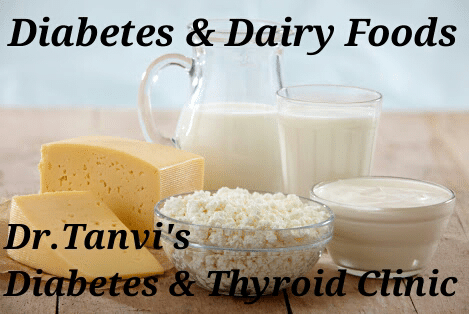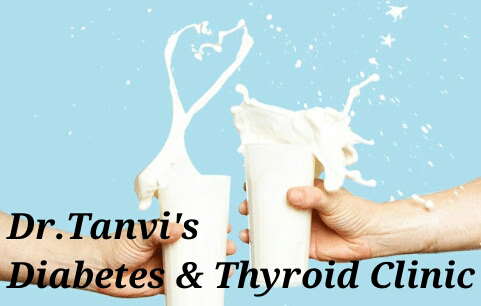Get the App
For Doctors
Login/Sign-up
Last Updated: Jan 10, 2023
BookMark
Report
One of the common doubt my diabetic people ask me about drinking whole milk or low fat milk
Dr. Tanvi Mayur PatelDiabetologist • 19 Years Exp.Masters in Endocrinology, MBBS, C.Diab, CCEBDM(DIABETOLOGY), CCMTD, DOMS
One of the common doubt my diabetic people ask me about drinking whole milk or low fat milk... let me clear the doubt in scientific way..
In fact, there are good reasons to believe that whole milk, full-fat yogurt, cream, and high-fat cheeses may be better for you than their low-fat alternatives.
Reason #1: Saturated fat is not harmful to your health
Reason #2: Low-fat and non-fat dairy products are higher in casein
Casein is a very sticky protein in milk that is quite difficult for humans to digest. Milk proteins are designed to nourish baby cows, who are outfitted with a special enzyme (rennet) that can break apart casein. Humans do not make rennet, which is one of the reasons why dairy products can cause constipation and other digestive problems.
Reason #3: Low-fat and non-fat dairy products are higher in whey
Whey proteins raise blood insulin levels just as much as pure sugar does. Even though lactose, the sugar that naturally occurs in milk, has a low “glycemic index” and therefore does not raise blood sugar very much, whey proteins trigger big insulin spikes in body and destabilize blood sugar and hormone levels, lead to carbohydrate cravings, fatigue, mood swings, and obesity.
Reason 4: High-fat dairy products contain less protein
This means that people who have dairy protein sensitivities may tolerate them better. People who have trouble with dairy foods are almost always reacting either to milk carbohydrate (lactose intolerance) or milk proteins (dairy allergy and sensitivity), not to dairy fat. This is why many dairy-sensitive individuals are able to eat butter and heavy cream, which are extremely low in protein.
Reason #5: High-fat dairy products taste better
They improve the flavor, digestibility, and absorption of foods and are more satisfying, therefore you may find yourself naturally eating less.
Bottom line: The lower the fat content, the higher the protein content
People who consume the most high-fat dairy products, have a 23-percent lower risk of developing type 2 diabetes than people who have one serving or less but there was no association between intake of low-fat dairy products and lowered type 2 diabetes risk.
Keep in mind that, you choose unsweetened varieties, since sugar and other refined carbohydrates raise insulin levels and disturbs blood sugar levels.
And MODERATION is the key for all the food .
Thank you for reading and i Hope it has helped you.
Source: Diabetologia
In fact, there are good reasons to believe that whole milk, full-fat yogurt, cream, and high-fat cheeses may be better for you than their low-fat alternatives.
Reason #1: Saturated fat is not harmful to your health
Reason #2: Low-fat and non-fat dairy products are higher in casein
Casein is a very sticky protein in milk that is quite difficult for humans to digest. Milk proteins are designed to nourish baby cows, who are outfitted with a special enzyme (rennet) that can break apart casein. Humans do not make rennet, which is one of the reasons why dairy products can cause constipation and other digestive problems.
Reason #3: Low-fat and non-fat dairy products are higher in whey
Whey proteins raise blood insulin levels just as much as pure sugar does. Even though lactose, the sugar that naturally occurs in milk, has a low “glycemic index” and therefore does not raise blood sugar very much, whey proteins trigger big insulin spikes in body and destabilize blood sugar and hormone levels, lead to carbohydrate cravings, fatigue, mood swings, and obesity.
Reason 4: High-fat dairy products contain less protein
This means that people who have dairy protein sensitivities may tolerate them better. People who have trouble with dairy foods are almost always reacting either to milk carbohydrate (lactose intolerance) or milk proteins (dairy allergy and sensitivity), not to dairy fat. This is why many dairy-sensitive individuals are able to eat butter and heavy cream, which are extremely low in protein.
Reason #5: High-fat dairy products taste better
They improve the flavor, digestibility, and absorption of foods and are more satisfying, therefore you may find yourself naturally eating less.
Bottom line: The lower the fat content, the higher the protein content
People who consume the most high-fat dairy products, have a 23-percent lower risk of developing type 2 diabetes than people who have one serving or less but there was no association between intake of low-fat dairy products and lowered type 2 diabetes risk.
Keep in mind that, you choose unsweetened varieties, since sugar and other refined carbohydrates raise insulin levels and disturbs blood sugar levels.
And MODERATION is the key for all the food .
Thank you for reading and i Hope it has helped you.
Source: Diabetologia




+1.svg)
